Scans Of The Inside Covers Of Strang’s Calculus, Which You Can Legally-download For Free Here From
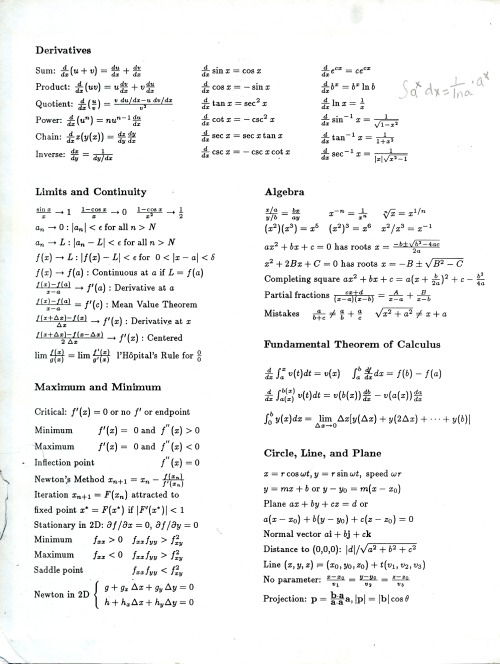
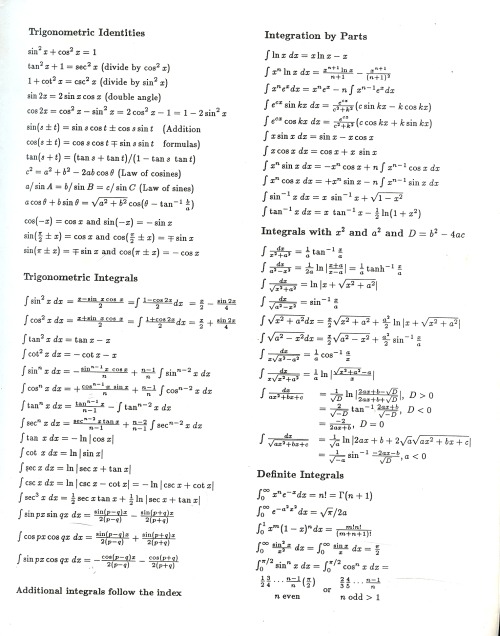
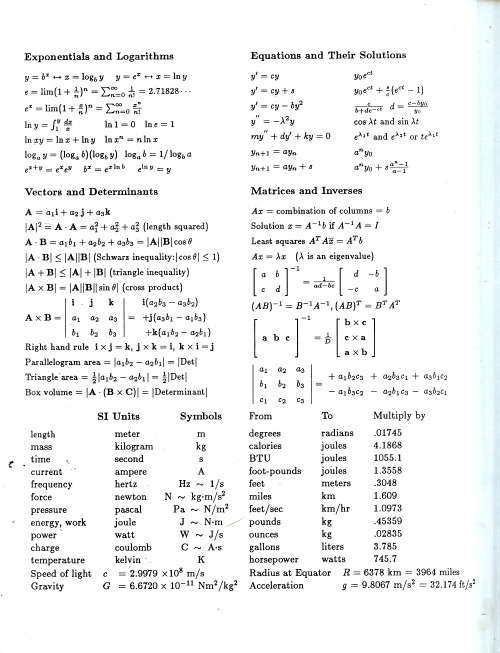
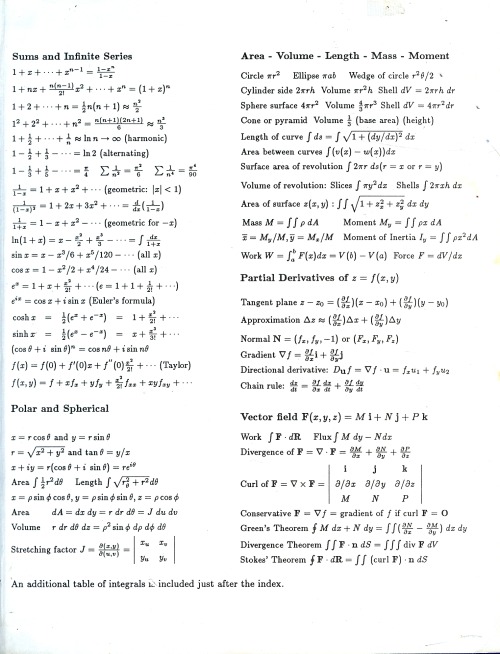
Scans of the inside covers of Strang’s Calculus, which you can legally-download for free here from the MIT website. This is my all-time favorite math or physics textbook. Scanned it so I could cut and paste it into my new sketchbook, wanna try and make a ~cool artistic~ reference poster out of it, ‘cuz I’ve been real into that idea since I took notes about rings for the algebra midterm on a big piece of watercolor paper.
More Posts from Purpletelescope and Others
Do you have any advice for how not to get overwhelmed when reading scientific literature, mainly primary research articles? I have to present one at the end of this month for in order to graduate from University and I'm trying to read through and understand it, but every couple of lines I start having a miniature panic attack because I feel as if I don't understand ANYTHING that I am reading
BOY HAVE YOU COME TO RIGHT PLACE BC I READ SCIENTIFIC PAPERS EVERY. SINGLE. DAY. /cries a bit
Don’t read the abstract first thing. I know a lot of people do, but that’s a big mistake if you’re not a super duper level 100 science genius. If you read the abstract without knowing the science really well, it’s going to sound like gibberish soon. Read the abstract last, because it serves as a good summary.
Instead, start with the introduction. This will give you the background information you need, and it always starts out very broad.
Skip the methods part for now. Read the Results after you read the intro, and refer back to the Methods section if you don’t know what some assay is, how the mice were fed, etc. But sometimes the methods section isn’t very helpful since they go into too much detail. That leads me to..
Don’t know something? Look it up! So you come across something like “aneuploidy”, and you have no idea what it means. Don’t try to gather information from context clues; just straight up Google it, or ask someone who knows. This is the most important thing. No one is ever going to understand everything in a paper (unless they wrote it, of course). Even the top scientists have to Google stuff all the time when reading other papers. Sometimes, you can even refer back to the references in the back of the paper for answers.
Jot down notes. Once you find out what aneuploidy is, write it down on the margin of the paper so you can refer back to it. Maybe even draw a small diagram too as an example.
Annotate the figures. The figures are very very very important. They’re what tells the story. If you understand everything in the figure–the question asked, the method used, what the x- and y-axes mean, etc, what the result was–then you will understand the entire paper. So scribble away. Draw arrows. Write notes. Circle things. Define acronyms. Color code stuff. This is what all the primary papers I read look like when it comes to figures:

(Also pay attention to the Figure legends. Sometimes they’ll tell you extra information)
Explain the figures out loud. If you can explain it in your own words, you’ve got it down! You’re going to have to do this for your presentation anyway.
If it helps, write down important observations/figure summaries on a separate piece of paper so you have something you can quickly reference when putting together your presentation.
As far as the presentation goes, I like to create my slides in this order: Title, Background, Hypothesis, Questions Asked (basically a summary of what they wanted to find), Question #1 (which is essentially what Figure 1 should be about), (Additional background if necessary), Method(s) used to answer Question #1, Figures that answer Question #1, Question #1 conclusion, Question #2, etc, etc, until finally, Conclusion, Future Goals. You may have a different format, but just throwing out the one I use.
You can do it! The trick to reading scientific literature is really… Google/ask questions for things you don’t know, and really understand the figures. And with anything that’s hard at first, practice will soon make it easier :) Good luck! If you need help with the specific paper, you can send me the first author’s name, title, and year published and I can see if I can help you with anything :)
gotta write a research paper for astronomy now whoops
shouldn’t be too hard tbh

done







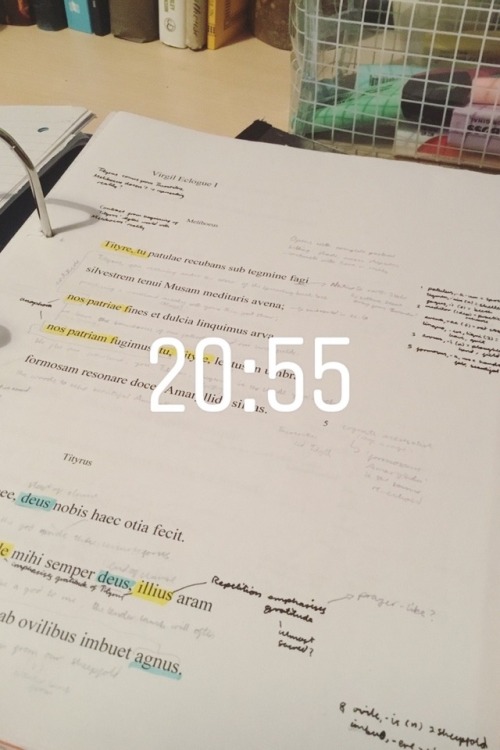

May study challenge day 23!
What type of learner are you (visual, kinetic, etc.)? How does this translate to your study methods?
I’ve never really had one particular learning type that works for me more than others - I try to study in different ways, but I guess my study style fits with a visual learning method more than others?
Today - a photo from a chemistry experiment, reviewing English, chemistry homework, violin practice, piano practice, making chemistry notes, music homework, Latin lit revision, and my cute little productivity tracker with a flower for each day 🌷🌟


my morning coffee / jupiter
Propagation of Error
When I first started in physics, I was utterly clueless about propagating error. After three years of college, I have a better grasp of it and feel more comfortable using it in the lab. Have a look if you’re having trouble with error propagation!
Error and Uncertainty
Error: an unknown quantity in the realm of the state of nature
Uncertainty: a parameter in the realm of our state of knowledge about nature
Type A uncertainty: statistical in nature (an example of this would be if you were launching an object 15 times and recorded each distance)
Type B uncertainty: not statistical in nature (an example of this would be a digital reading on a scale - no matter how many times you put the same object on the scale, you will get the same reading)
Random vs Systematic Error
Random Error
environmental fluctuations
equipment noise
natural processes
Systematic Error
environment: fixed beyond a relevant parameter
measurement technique: assumptions, experimenter bias
equipment with an offset or using equipment beyond its limits
uninformed choices
You can reduce random error by taking more measurements.
You can reduce systematic error through thoroughness, properly calibrating equipment, reading manuals, and ensuring reproducibility.
Basic Error Propagation
This is the standard equation for error propagation:

This represents the uncertainty in the measurement of some value x. Suppose you are measuring this value based on this equation:

You took three measurements, a, b, and c, and plugged them into this equation to get x. However, there is some uncertainty associated with each of these three values. Let’s say you measured a on a scale, b on an oscilloscope, and c with a ruler. There is uncertainty associated with all of those measurements. When you’re reading the scale, you read it as 15.45g. Let’s assume there is an uncertainty of 0.01g in that reading. Similarly, you read your oscilloscope to be 3V, and there is an uncertainty of 0.05V. You read your ruler to be 3.45cm, and there is an uncertainty of 0.05cm. We now have our uncertainties for the three values:
a = 15.45g +/- 0.01g
b = 3V +/- 0.05V
c = 3.45cm +/- 0.05cm
The other aspect of the uncertainty equation is taking the partial derivative. Those are the dx/da and dx/db parts of the equation. We will take the partial with respect of each term.
The partial derivative of the equation for x with respect to a is 2a2
The partial derivative of the equation for x with respect to b is 2
The partial derivative of the equation for x with respect to c is 4.5
Now, we can plug into our equation:




Your uncertainty in your measurement for x is +/- 22.86.
I hoped this helped you if you’re struggling with uncertainty!

Schedule: work on that paper, mayb-
Brain: see how many superscripts and subscripts you can make before LaTeX throws a shit fit

Hi ! Since a friend asked me for some tips to study better, I thought that it would be a good idea to share them with you all !
First of all, I started to have really good grades only once I started to apply exactly what is on this list ! On the beginning of the last year I had grades that went around 15/20 (French scholar system works with grades on 20, not on 100), which was good but I wasn’t the first of my class at all, and then in the end of the year and even right now, I have an average of 17/20 (without P.E obviously lmao), which is considered extremely good as a scientific senior student here !
Anyway I think that most of those tips are already well known but maybe you’ll find things that you didn’t think would work but actually do !
1- Do all of your homework (if possible)
This is some basic tip but God knows that it is the most important thing ever. Practice makes perfect, and I KNOW that sometimes you’ll be too tired to calculate the weight of a satellite which turns around the Earth in 239 days but even if you don’t feel like writing it down, just try to think about it, to find the methodology to do this exercise, because you have high chances to have this exercise again during your test ! Which lead us to the next advice…
2- Always write down the correction of your exercises when your teacher corrects them in class
Well I do think that it is the most important thing that I didn’t do last year and that I do now and it helps me so much. Like I said earlier, in maths, physics, literature and so on, there’s always a methodology that works almost universally for each type of exercise. So you have to listen carefully in class and take notes in case you didn’t understand something that might be important, and even after writing the methods and the corrections you don’t know what to do…
3- Ask a professor or a friend, or check videos on YouTube if this is still blurry in your mind
WE DON’T REPEAT THIS OFTEN ENOUGH BUT YOUR PROFESSORS ARE HERE AND PAID TO HELP YOU ! Even if you don’t like them, if you want to understand a subject you have to ask someone who could explain it to you ! If you’re in college and asking a teacher is not possible, then ask a friend you know they can explain it to you ! Don’t be ashamed of not understanding, this is absolutely natural. Then, if you still don’t understand, maybe you’ll find the answer to your question at our dear friend Google or even better, on YouTube ! Personally I think that Khan Academy is absolutely great for sciences ! Also I don’t really know about american YouTube channels that focus on school, so it’s up to you to find a channel that suits you ! (For my frenchies passant par là Les bons profs et Yvan Monka mes sauveurs).
4- Do not spend time uselessly !!!
Dear God how much time I spent on Twitter and YouTube just REFRESHING FOR NOTHING knowing that I have a test the next day 😭 I realized how much time Twitter would take me each day during the summer holidays so I decided to « delete » my account (I just log in once in a while so my tweets stay here, I don’t want to loose my threads on the Attack Titan and Hanji Zoe).
I also decided this year that once I’m home after school, I’ll just use my phone while I’m eating something and then leave it in the kitchen, and NOT USE IT until I finished all of my homework, even if it’s 10pm and half of my friends sent me a text about interesting things ! Also OBVIOUSLY no Netflix and series and anime once I’m done, but…
5- Don’t overwork yourself
If your studies are your priority like me, then you’ll put your homework before your activities, or even your sleep, because you’d feel guilty or even more stressed because you didn’t learn everything you had to and your test is the next day. Until now I can sleep at 1am and wake up the next day at 6 if I didn’t learn everything, and do that all the week until I have nothing to learn (this is an extremely rare case).
DO NOT DO THAT ALL THE TIME
You can allow you to do that when it’s a really important test, but if this is a really quick vocabulary test, then you should prioritize your sleep ! Then, if you’re really in deep shit you can learn on your way to school (flashcards yayy)! Sometimes when you’re really in a hurry your brain can memorize things so much faster I swear ! But of course, if you want to not do that all the time you have to be really organized, so next tip is…
6- Organize your week if you can !
This is so important to do that omg ! This is the newest thing I’ve been doing and it helps me sooooooooooo much omg ! Personally I have a bullet journal in which I organize what I’ll do each day, and (evenifthosedaysicompletelylostmybalance) now I can find some time for me to draw or just to sleep a bit more lol.
Make To-Do lists, have your own Bujo, just write down everything you have to do this week on your phone, at least you know you won’t miss something that might be important, and in the long run, you’ll find more time to learn your lessons and to do more exercises, and at the end of the semester you’ll have better grades ! But of course this is a question of MOTIVATION !
7- Last but not least, find a way to motivate you !
I think that if you want better grades, that’s for a reason after all ! Then if you’re feeling too lazy to work, just think about the reason that motivates you to go to class and to learn your lessons !
Making your parents proud, doing the job of your dreams, having a lot of money maybe, I don’t know what motivated you to read this post so far but just think about the pride you’ll have when receiving a 98/100! Then you’ll be able to help your friends with the subject you used to struggle with, and btw this is truly a wonderful feeling to graduate with all of your friends ! After that, the reward of holidays will be such a delightful thing 💕
This is all for now ! I might update this post if I remember something that I missed ! Also I’m really sorry if my English is awful, it’s been a while since I truly practiced it !
Just remember that even if you are in the top, intelligence doesn’t do all of the work and this is a progressive work that will help you getting even better results !
Edit: omgggg thank you so much for all those notes💕💕💕 ! I’d never imagine that this post would be this helpful !! I’m kind of curious about how much those tips helped you during the semester ! So if you think you see a progression do not hesitate to hit me up or leave a comment !
-
 silkymacarons liked this · 4 months ago
silkymacarons liked this · 4 months ago -
 how2disappearcomp1etely liked this · 5 months ago
how2disappearcomp1etely liked this · 5 months ago -
 ally04203 liked this · 7 months ago
ally04203 liked this · 7 months ago -
 meto4 reblogged this · 1 year ago
meto4 reblogged this · 1 year ago -
 meto4 liked this · 1 year ago
meto4 liked this · 1 year ago -
 totallyteejaylearns reblogged this · 1 year ago
totallyteejaylearns reblogged this · 1 year ago -
 forever-lunasea liked this · 1 year ago
forever-lunasea liked this · 1 year ago -
 gddancefloor liked this · 1 year ago
gddancefloor liked this · 1 year ago -
 gabrielkoshkin reblogged this · 1 year ago
gabrielkoshkin reblogged this · 1 year ago -
 gabrielkoshkin liked this · 1 year ago
gabrielkoshkin liked this · 1 year ago -
 chrisufonhe liked this · 1 year ago
chrisufonhe liked this · 1 year ago -
 cirenfuncflan liked this · 1 year ago
cirenfuncflan liked this · 1 year ago -
 giaasblog liked this · 1 year ago
giaasblog liked this · 1 year ago -
 mossgreeneddie liked this · 2 years ago
mossgreeneddie liked this · 2 years ago -
 lidensword liked this · 2 years ago
lidensword liked this · 2 years ago -
 variablecemetery liked this · 2 years ago
variablecemetery liked this · 2 years ago -
 daratheuncrowned liked this · 2 years ago
daratheuncrowned liked this · 2 years ago -
 puellamaligna liked this · 2 years ago
puellamaligna liked this · 2 years ago -
 adikusworld liked this · 2 years ago
adikusworld liked this · 2 years ago -
 diversespeaks reblogged this · 2 years ago
diversespeaks reblogged this · 2 years ago -
 modehthings liked this · 2 years ago
modehthings liked this · 2 years ago -
 ambientsoundtrackfan reblogged this · 2 years ago
ambientsoundtrackfan reblogged this · 2 years ago -
 juurgi reblogged this · 3 years ago
juurgi reblogged this · 3 years ago








